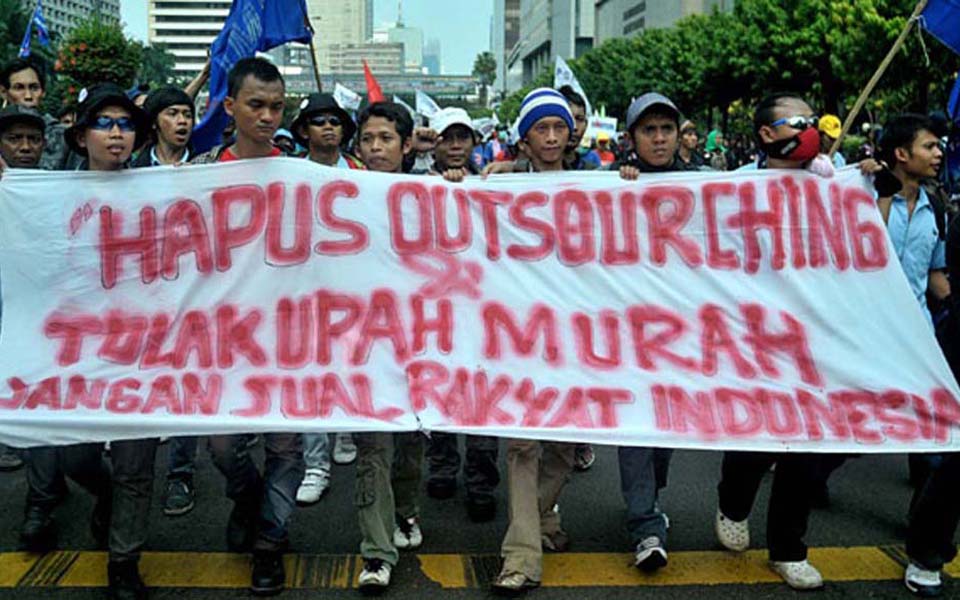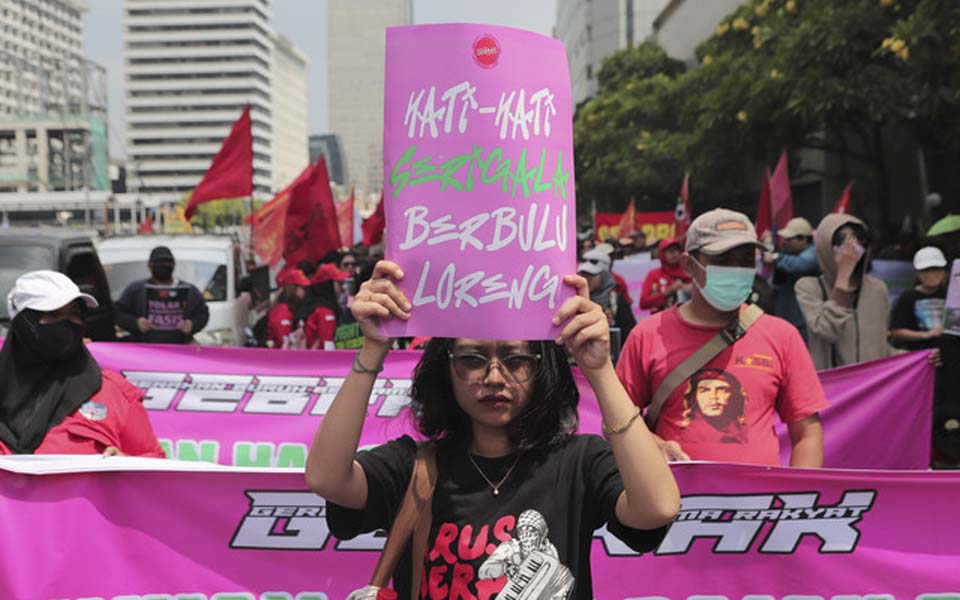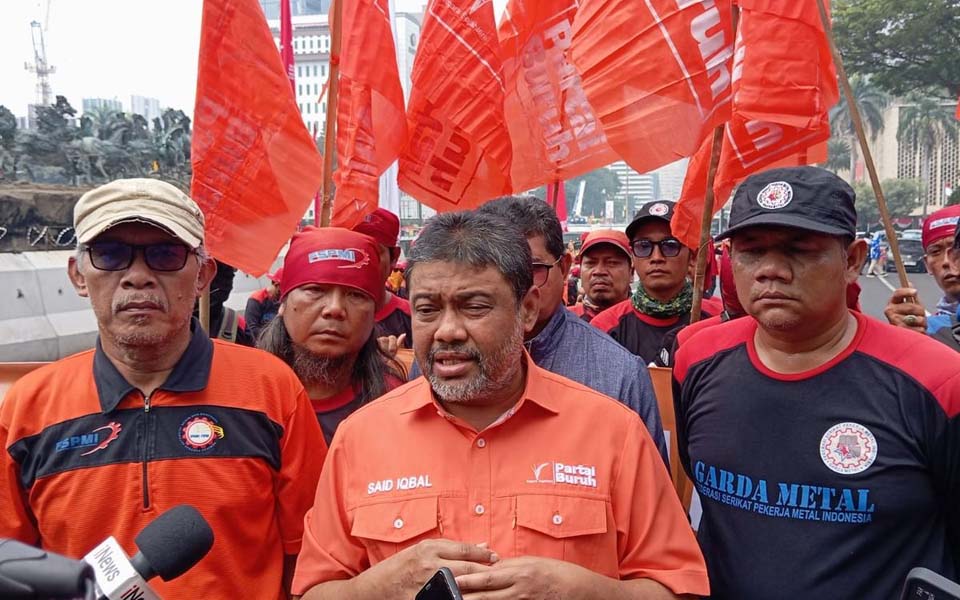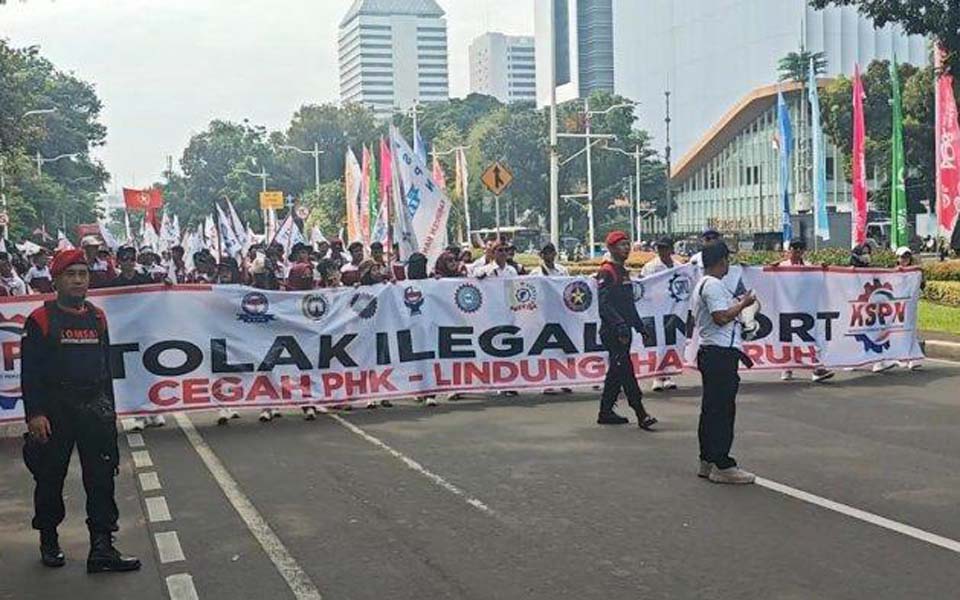Basic changes in the struggle by the working class before and after reformasi represent a shift from a struggle for wages and conditions to a struggle for job security.
Since the enactment of Law Number 13/2003 on Labour, in particular Article 56 Paragraph 2 on Work Contracts for a Specified Period (PKWT) and on company contractors and labour services (outsourcing), the recruitment of contract workers and outsourcing has largely been carried out by third parties.
This has given birth to brokering practices that tend to favour the criteria of human trafficking rather then a distribution of labour that is fair for all parties.
Ade (25), not his real name, confidently entered the grounds of a factory in Serang, Banteng regency, West Java. His letter of acceptance as a new employee at the electronics assembly factory made the high school graduate feel like he was walking on air. At the entrance to the factory however, a person standing at the security post stopped him.
“Who delivered you to this factory?” they asked. When Ade showed his acceptance letter, the security guard snapped, “You have to pay 2.5 million rupiah if you want to work here”. Ade’s dream was shattered. He was forced to give up because he was unable to pay the “entrance fee”.
“I gave 2 million rupiah to my younger brother to pay an [employment] agent”, said Yangto. With that money they were able to work for a year with a monthly wage in accordance with the municipal minimum wage (UMK) of 927,000 per month. “After that, if he wants to keep working there, he has to pay again”, he added.
Employment agents
Employment agencies are not actually new to the area. Although as suggested by another workers – let’s just refer to him as Ratno – it has become a growing trend over the last five years. When he wanted to get a job he had to come up with 2-3 million rupiah to get a work as a contract worker for six months to a year.
“Yesterday there were two people who started work, [they] paid 2 million rupiah to work for three months. If their work is good, it could be extended for three more months. But, after that the [employment] agent is no longer responsible. Meaning, if they want to continue, yeah well they have to pay again”, said Risman.
With a wage of 927,000 rupiah per month, an “entry fee” of 2 million rupiah really doesn’t make any sense. But according to Bagus Musharyo, the coordinator of the Jakarta Social Institute for Labour, a job is a status symbol for jobseekers in the area.
This kind of attitude has provided fertile grounds for brokering practices and indicates a progressive weakening of workers’ bargaining position. Welfare and workers’ rights, which in the past were the subject of struggle, have now evaporated.
“If you don’t come into work wages are deducted as well as [your status as a] permanent employee,” said Wati, a women worker in Serang. Special leave for women has also ceased to exist. Pregnant women may have to work the third shift, meaning they have to work from 11pm until 6am next morning.
Strong network
Employment brokers have become better organised with assistance from “inside people”. According to Nanang, another worker, out of the fee of 2.5 million rupiah, as much as 1 million goes to unscrupulous managers at the factory, 500,000 is for rouge village officials and the remainder is for the broker – who refer to themselves as “labour service providers”.
According to Yanto, if a factory is seeking labour services the brokers always do it using the name of local people because they should receive preferential employment opportunities.
“In reality local people also have to pay the same amount of money to brokers in order to get a job. I was asked for 2 million rupiah if I wanted to work at a certain factory there,” said Dul, a local resident who has been unemployed for a year.
Arman, another employee at a factory in Serang, said that employment brokers began to take root in his area over the last three or four years. “They are like a mafia because their network involves rogue military and police officers. They spread terror and fear”, said Arman.
This intimidation is not just in the form of threats, but also physical violence. It is for this reason that they don’t want there real names mentioned.
In April this year, the Serang Labour Solidarity Forum (FSBS) found that the recruitment of contract workers and outsourcing by third parties had become an attractive choice for many companies because – aside from not having to spend money on finding new employees – the system allows companies to avoid paying severance pay.
For the general chairperson of the Indonesian Employers Association (Apindo), Sofyan Wanandi, systems of contract labour and outsourcing are a dilemma. On the one hand, companies loose money because they have recruit and train new workers.
On the other hand however, companies benefit because under contract labour systems and outsourcing they are not burdened by the obligation of paying severance when employees are sacked.
According to Wanandi, the cost of severance pay is extremely high, so supposing a company goes bankrupt, and the company is sold, many are unable to pay severance pay. “These days many companies pay a game of cat and mouse and use contract systems and outsourcing for essential jobs at their companies”, he said.
Aside from the issue of brokers, industry also faces the problem of illegal fees. In Serang for example, as related by Nanang, each company has to pay a monthly “donation” to several different parties, including unscrupulous village officials, military and police officers and “local security”, which comes to as much as 150,000-500,000 rupiah per institution. “Multiply that by the hundreds of companies here. It’s a lot of money”, he said.
In addition to illegal fees, other taxes are levied, which according to Wanandi come to is as much as 10 percent of production costs.
These levies continued Wanandi, are far too high compared with the wage cost component of capital intensive enterprises of 10 percent and a labour intensive enterprises of 25-30 percent. “Illegal fees and brokering must be quashed. That’s the government’s job”, asserted Wanandi.
Labour law revisions
Under a situation such as this, the most important thing that needs to be done at the moment is revising the labour law. Hendri Saparini, an economist from the Indonesian Awakening Team, says that contract labour and outsourcing do not represent a solution to problems facing global industries.
“We also don’t agree with contract labour and outsourcing. But, there must be solution that is fair for both workers and businesspeople”, said Wanandi. “We must push for a tripartite forum to bring together employers, workers and the government to revise the law”, he said.
Saparini added that the system of recruitment through brokering also hurts companies because they are unable to find the best quality employees. “Thus, there’s no one who can produce a breakdown of labour [resources], for example how many are skilled in field A and how many people in B. There’s no specialisation”, he said.
The rate of deindustrialisation in the manufacturing sector may well be influenced by this situation. “The slowdown has been consistent from year to year. In 2004 growth was 7.2 percent, in 2005 it was down to 5.8 percent, 2006 to as much as 5.2 percent, and in 2007 as low as 5.1 percent,” said Saparini.
This decline can appears to be running parallel with the enactment of Law Number 13/2003. So who then, is the real culprit behind all these problems?
[Translated by James Balowski.]















